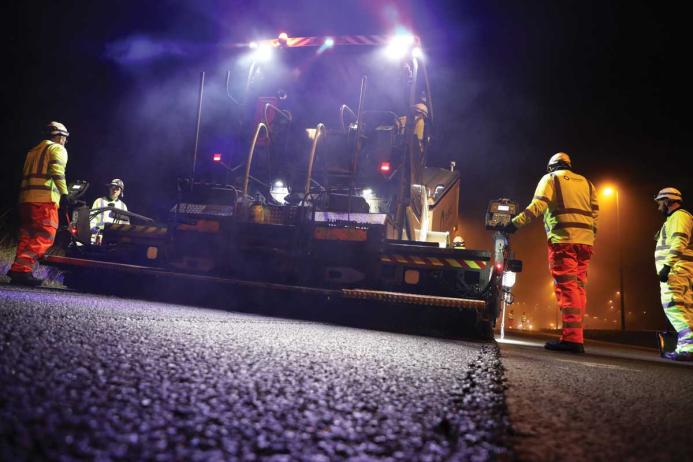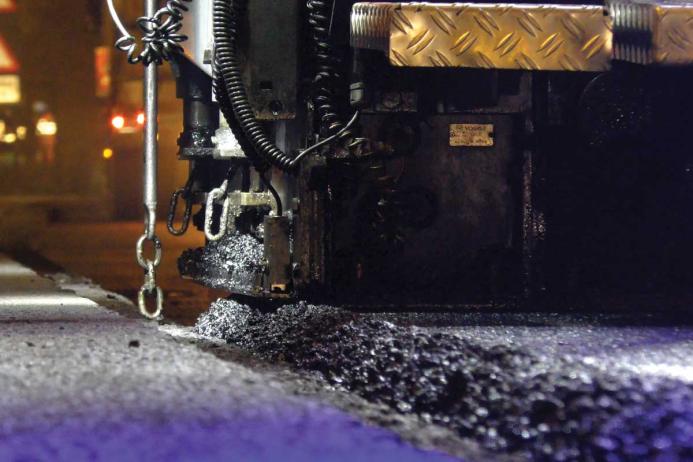Making warm the Norm

First published in the July 2023 issue of Quarry Management
Embracing the environmental and economic efficiencies of warm-mix asphalt. By Richard Ashton, market development manager Bitumen, TotalEnergies UK
Climate change poses a threat to our highways and every sustainable step we take as an industry can slow both the vicious cycle of degradation shaping our highways, and our global trajectory towards extreme weather conditions. By taking a long view of highway asset management through smart material and maintenance decisions that reduce the need for ad-hoc issues management, we can reduce the total environmental impact of the highway across its lifecycle and future-proof our most valuable infrastructure asset.
In 2019, manufacturing industry accounted for around 9.7% of emissions and greenhouse gases (GHGs) in the UK[1]. While decarbonizing the industry may pose certain challenges, there have been substantial advances across the supply chain to embrace and embed carbon reduction measures that prioritize sustainability through durability, including tackling road issues before they become critical, investing in high-quality materials that are fit for purpose in more extreme conditions, and preferencing processes and production methods that reduce energy consumption.
As carbon credit innovations are rolled out across the sector, reducing emissions through fuel and energy consumption innovations will be holistically important as one of the most significant reduction opportunities across the highway construction process. Chief amongst these lies warm-mix asphalts (WMAs), such as TotalEnergies’ ECO2 bitumen product range. WMAs have revolutionized the road construction industry by offering a more sustainable alternative to traditional hot-mix asphalts. Indeed, Highways England (now National Highways) has found that warm-mix asphalts can reduce carbon emissions by around 15% compared with their hot-mix alternatives[2].
In a period of inflationary pressures and tightening budgets, the widespread adoption of warm-mix asphalts by local councils and contractors not only aligns with the global drive for environmental stewardship but also brings about economic advantages by reducing maintenance and repair costs over the lifespan of the roads.
By incorporating such sustainable bitumen products into the industry’s practices, the bitumen sector can take a significant step towards decarbonization while maintaining the quality and performance of asphalt materials. Here is how:
Reduced energy consumption
One of the primary advantages of warm-mix asphalts is their significantly reduced energy requirements during production and placement. By conserving energy, WMAs contribute to the overall reduction in carbon footprint and dependency on fossil fuels. Unlike hot-mix asphalts (HMAs), WMAs are manufactured and applied at lower temperatures, typically between 100°C and 140°C. The lower production temperature translates into a substantial energy consumption reduction of up to 30% at the point of mixing. At the same time, the reduced fuel consumption presents a financial gain for contractors looking to stretch tight budgets over a growing backlog of critical road repairs.

Reduced emissions
WMAs emit lower levels of greenhouse gases during production due to the reduced fuel consumption, reducing overall emissions at the point of laying by up to 50%. Additionally, the lower temperatures at which WMAs are applied minimize the release of volatile organic compounds (VOCs).
Recycled materials
Promoting the recycling and reuse of bitumen and aggregates as a substitute for virgin constituents can contribute to decarbonization efforts by diminishing the strain on natural resources and the mileage associated with procuring the materials. Warm-mix asphalts are designed to incorporate recycled asphalt planings (RAP) at a higher percentage than their hot-mix alternatives, reducing the need for new bitumen production and the associated emissions. By promoting the circular economy and reducing waste, WMAs contribute to a more sustainable and resource-efficient asphalt industry.
Moreover, embracing circularity can represent a better return on investment at a time when inflation is challenging the sector’s capacity to tackle mounting road degradation issues. As the 2023 Annual Local Authority Road Maintenance survey[3] found, there is a £1.3 billion shortfall in English local authorities’ annual budgets to tackle an 11-year backlog of road repairs. Incorporating recycled materials can represent significant carbon savings by reducing the quarrying, equipment and transportation needs of virgin materials.
Technical performance
WMAs can offer improved workability at lower temperature and handling characteristics compared with HMAs. The lower viscosity of warm asphalt mixes allows for better coating of aggregates, meaning that there is no compromise on the compaction and pavement durability compared to HMA alternatives. The extended workability window of WMAs also allows construction crews to achieve consistent compaction levels, even under challenging weather conditions or during extended haul distances.
Additionally, the reduced mixing and compaction temperatures of WMAs minimize the risk of thermal burns and other occupational hazards faced by workers during asphalt placement. The improved safety profile of WMAs ensures a more comfortable and secure work environment, leading to increased productivity which can expedite associated processes and so reduce fuel and energy consumption overall. National Highways estimates that warm-mix asphalts could provide a productivity boost of 20% per shift, resulting in savings of up to £70 million a year.

Sustainability through durability
The long-term performance and durability of road surfaces are critical factors in reducing maintenance costs and maximizing the lifespan of pavements. WMAs exhibit excellent resistance to moisture damage, aging, and cracking, while the lower mixing temperatures of WMAs prevent the premature aging of binders, potentially resulting in a more robust and long-lasting pavement structure.
Additionally, the enhanced workability of WMAs facilitates the achievement of consistent compaction and density, reducing the likelihood of air voids and water infiltration. This, in turn, increases the pavement’s resistance to long-term oxidization, resulting in a smoother and safer driving experience for motorists.
The adoption of warm-mix asphalts in the road construction industry is an intelligent and sustainable choice that benefits both the environment and the overall performance of road infrastructure. By reducing energy consumption, lowering emissions, enhancing workability, and optimizing contract efficiency, WMAs contribute to a greener and more efficient asphalt sector.
REFERENCES
2019 UK greenhouse gas emissions, provisional figures, Department for Business, Energy & Industrial Strategy, National Statistics, 26 March 2020.
Highways England accelerates switch to lower carbon asphalts, Highways England press release, 18 August 2021.
Annual Local Authority Road Maintenance (ALARM) survey, Asphalt Industry Alliance, 2023.
Subscribe to Quarry Management, the monthly journal for the mineral products industry, to read articles before they appear on Agg-Net.com








